sustainability
At the deggendorf institute of technology
Sustainability is a central topic at Deggendorf Institute of Technology today and in the future programme. It is therefore essential for us to develop a comprehensive strategy on how sustainability can be integrated into all areas of the university, practised by all members of the university and taken out into the world. It is important for us to consider the ecological, economic and social perspectives equally and to combine them with one another.
German society has developed very positively in recent decades, with an innovative and efficient industry and a strong SME sector enabling both a highly developed social system within the framework of a social market economy and progressive environmental protection embedded in a liberal democracy.
We are living in demanding times and are facing major challenges in the environmental sector, but also with regard to demographics and the healthcare system. In order to safeguard what we have achieved so far, it is necessary to develop new ways of meeting these challenges. Under the programme name SUSTAIN! numerous programmes, projects and activities are being carried out at DIT.
This page collects these programmes, projects and activities relating to sustainability, with a focus on the environment, demography and health. It provides an insight into the university's current commitment to sustainability and presents projects from various departments. Suggestions for active participation can also be found on this page. In addition, some further reading tips are presented that not only deal with sustainability at DIT, but also shed light on the topic at both an individual and global level.
how the university is involved

The main campus of the Deggendorf Institute of Technology is supplied exclusively with electrical energy from renewable sources. In addition, this campus has photovoltaic systems for its own electricity generation. The sustainability campus European Campus Rottal-Inn (ECRI) also only uses green electricity.
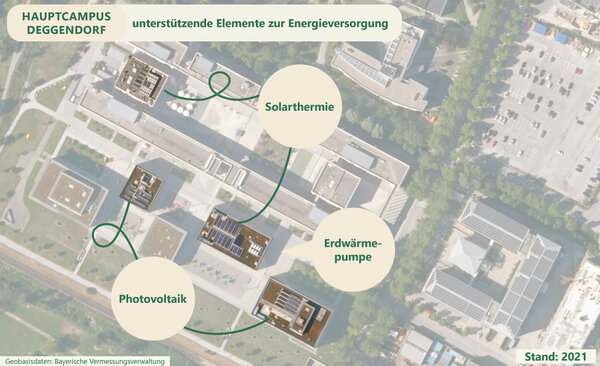
The heat supply at the main campus in Deggendorf is partly provided by natural gas, but geothermal heat is also used by means of a geothermal heat pump. In addition, a solar thermal system contributes to heat generation on a smaller scale. The Pfarrkirchen campus (ECRI) is also supplied with heat by an air source heat pump in addition to a gas boiler.
The charging infrastructure for electric cars is currently being expanded and supplemented at DIT locations. The graphic shows the current number of charging points at the university's various locations.

Only LEDs are used for the outdoor lighting at the Deggendorf campus. The university is closed during the Christmas period, which leads to a strong decrease in electricity and gas consumption during this time.
Likewise, an improvement of the energy monitoring in the new building and at the campuses in general is being planned in order to ensure an improved collection and presentation of data and thus enable further optimisation.
The Deggendorf Institute of Technology participates and is involved in several networks and working groups, both within and across universities. These include the Bavarian University and Sustainability Network and the Working Group on Sustainability at Universities. In addition, the Working Group on Sustainable Development has been established at the Deggendorf Institute of Technology.
sustainable projects
At the Deggendorf Institute of Technology, there have been activities and efforts around the topic of sustainability for several years. The first time this was formally organised was with the founding of the Sustainable Development Working Group in 2016. In 2021, the university's first sustainability officer was finally appointed, thus anchoring sustainability in the official structure of the university for the first time.

Energy efficiency and climate protection at HAWs (Project - Environment)
In this project, DIT has been tackling the challenges of energy efficiency and climate protection together with eight other German universities since October 2021. The aim is to develop practical intervention strategies and individual measures to save energy. These are explicitly aimed at UASs, as they are currently growing strongly, are generally working with scarce resources, necessary modernization processes in administration are pending, research is experiencing an increase in importance and is traditionally decidedly application-oriented and, on the other hand, there are no strategies focused on the type of university.
The associated database contains numerous examples of measures and actions that can serve as inspiration.
Further informationen on the project.
Project manager DIT: Prof. Dr.-Ing. Michael Laar
Climate Protection Management | BMUV
... is funded by the Federal Ministry for Economic Affairs and Climate (70%) and ECRI (30%) and is part of the National Climate Initiative (NKI).
Over a period of 2 years, balances will be drawn up and action plans developed and implemented to reduce the environmental impact of our university. The Bavarian state government intends to achieve climate neutrality for universities by 2030.
Project period: 2023 - 2025
Project participants THD:
Prof. Dr.-Ing. Michael Laar
Sandra Steiner, MBA
INTERREG (Project - Demography)
interregional (Germany, Austria, Czech Republic) to develop the workforce for the tourism industry
DeinHaus4.0 (Project - Demography)
Active (and) assisted living that addresses the needs of an ageing society.
VITAL (Healthy University) - (Program - Health)
Ergonomic workplaces, prevention and sports activities for employees and students
Health Campus – Bad Kötzing (Programme)
TC Plattling - Modern mobility (Programme - Environment)
Cooperation with regional industry, e.g. through Bachelor's and Master's theses and R&D projects (Projects - Environment)
Introduction of a new infrastructure for energy and water meters at the main campus (Project - Environment)
Introduction of a new infrastructure for energy and water meters at the main campus (Project - Environment)
Emergency measures to save energy in winter 2022/23 due to the war in Ukraine (Project - Environment)
THermo - Intelligent system that connects the heating system with the occupancy plan (Project - Environment)
FOOD, NOT WASTE: Pre-ordering system in canteens to avoid unnecessary production and waste (Project - Environment - under discussion)
RegiFood - Regional products (Project - Environment - under discussion)
CHECK IT OUT... Vegan and vegetarian alternatives are offered. (Programme - Environment)
Interaction with society
- DigiCamp - "Sustainability" lecture series open to the public
- Exhibitions & conferences
- Stakeholders - integrated programme development
Goals:
In the Faculty of Civil and Environmental Engineering, the topic of sustainability has been anchored for a long time, especially in the Environmental Engineering degree programme. Through the various modules, students acquire the competence to reduce energy consumption in buildings, conserve natural resources, make more use of renewable energies and manufacture building materials in an environmentally conscious manner. This enables them to make a significant contribution to the protection of people, nature and the climate in their later careers.
In addition, especially in the module Sustainable Building I, students are taught basic knowledge of the ecological, economic and socio-cultural aspects of sustainability for systematic implementation in the company, on building products and buildings. This knowledge can then be further deepened in the Master's programme.
Projects:
Sustainability projects of various kinds are already being realised through Bachelor's and Master's theses at or in cooperation with companies. For example, through evaluation systems for sustainable buildings according to DGNB or BNB, through the introduction of environmental and energy management systems, the preparation of life cycle assessments or the analysis and evaluation of products according to Cradle to Cradle Certified®.
More information will follow shortly.
THermo - Intelligent system that connects the heating system with the occupancy plan. In cooperation with the Faculties of Mechanical Engineering & Mechatronics and ECRI (Project - Environment)
THermo - Intelligent system that connects the heating system with the occupancy plan. In collaboration with the Faculties of Electrical Engineering & Media Technology and ECRI (Project - Environment)
More information will follow shortly.
More information will follow shortly.
More information will follow shortly.
Goals:
Sustainabiliy plays an important role at the very internationally oriented and English-speaking European Campus Rottal-Inn (ECRI) in Pfarrkirchen. It functions decidedly as a "sustainable campus", i.e. numerous approaches are tested here so that, if successful, they can subsequently be implemented at other locations.
In addition to the Master's programme Healthy and Sustainable Buildings (HSB), the HSB and the Sustainability lab, there is a "BikeStation" for students. ECRI was awarded the "Silver" seal in the EU-wide "Bicycle Friendly Employer" certification in January 2023.
A new campus building will be constructed at this campus in the next few years, which will be oriented towards the BNB certification.
PV integration in existing campus buildings: The European Campus Rottal-Inn consists of two two- and three-storey timber-framed buildings housing more than 1 500 students and employees. Due to structural limitations, the main roofs are not suitable for PV. Therefore, a student project is currently developing a solution for the canopy of the building and the covered bicycle storage room (orientation: Prof. Michael Laar, Prof. Stefan Matefi-Tempfli, teacher for special tasks Ing. Wolfgang Schauer).
Projects:
- European Campus Rottal-Inn (ECRI) (Programme - Demography) - Specialized campus for international students - Preparation for the job market - "qualified immigration"
- "Sustainability Campus" (ECRI) - new approaches are implemented and tested and, if successful, implemented on other campuses. UN sustainability goals as a guideline in degree programs (Programme - Environment)
- Network Health Tourism Forest at ECRI
- DanuP-2-Gas at the Technology Centre Energy at the University of Applied Sciences Landshut with management from DIT
- KERATON - Research into material-reduced ceramic hybrid building materials made of clay foam with high-performance insulating materials for thermal insulation for energy-optimised buildings.
- Research projects about "Green Gases", together with the University of Applied Sciences Landshut
- Smart & Healthy Hotel rooms
- LivingLab! at ECRI (Programme - Environment) - The LivingLab! approach tests developments and makes them transparent for employees and students: it raises awareness, tests new developments and concepts, enables adaptations and trains national and international multipliers.
- LivingLab! at ECRI
- Sustainability Lab
- ECRI news
- StuCoS - Psychosocial Counselling at ECRI (Programme - Health)
- Med4PAN - Research project with the aim of improving medical care in rural areas (project)
- THermo - Intelligent system that connects the heating system with the occupancy plan. In cooperation with the Faculties of Mechanical Engineering & Mechatronics and Electrical Engineering & Media Technology (Project - Environment)
Tap water-friendly university

In summer 2023, the European Campus Rottal-Inn (ECRI) was recognised as a tap water-friendly university by the non-profit association "a tip: tap". A central component of this initiative is the drinking water fountain, which was realised thanks to a donation from the District Association of Lower Bavarian Savings Banks. This fountain enables students and staff to enjoy fresh and free tap water at all times.
The installation of the fountain has already saved 34,000 plastic bottles of 0.47 litres each (as of 05.07.2024), which represents a significant contribution to environmental protection. According to "a tip: tap", the average emission factor of bottled mineral water is 202.74 g CO2 equivalents per litre, while that of tap water is only 0.35 g CO2 equivalents per litre. This means that 3.24 tonnes of CO2-eq have already been saved at the ECRI by using the water dispenser. In addition to saving emissions, drinking tap water also reduces waste. Assuming that a 0.5 litre PET bottle weighs approx. 10.9g, the drinking water dispenser has avoided around 371 kg of waste in the form of plastic bottles.
The project also aims to emphasise how good the water quality is in Germany. For many international students, drinkable water from the tap is not available in their home country and they can be sensitised through the project.
DIT's Centre for Academic Further Education (ZAW) has been offering in-service training programmes for employees and companies since 2002. During this time, the ZAW has grown steadily and has continuously launched new in-service programmes. Especially nowadays, with a shortage of skilled workers and almost full employment, it is difficult to attract qualified employees to companies. That is why it is all the more valuable to retain and further qualify one's own employees. That's why the Centre for Academic Further Education works intensively with companies to tailor its programmes to the needs of the business community.
One of these study programmes deals specifically with the topic of sustainability and digitalisation. The part-time Bachelor's programme in Sustainability, Governance and Digitalisation is oriented towards the pulse of time by showing and following the path from the administrator to the decision-maker in an interdisciplinary way. For this, a comprehensive and solid foundation is created to enable future employees to successfully participate in the labour market.
What does digitalisation mean in concrete terms, how do companies have to adapt their strategy and organisation in order to be successful in the long term and where do managers and employees find themselves in a partially automated, digitalised workflow process organisation? What competences will be needed in the future to do the right thing? These requirements must be met by companies and employees alike. With the practice-relevant modules, the basis and thus the prerequisite is created to be able to exist on the international labour market and orientation to standards. The modules in the degree programme create transparency and understanding for the often nebulous-seeming topic and show clear structures and practical working aids.
With a Bachelor's degree in economic, ecological and social sustainability, combined with governance and digitalisation management, graduates are considered all-rounders in a new, promising professional field. As sustainability / transformation managers, they are independent of the sector, size or department of a company and can take a job in middle to upper management. Sustainability / transformation managers are needed in every company and also in larger departments. In the study programme, participants learn to understand these areas of responsibility and processes within a company, to identify interrelationships and to enable successful management.
Thanks to the hybrid lecture concept of online evening events in live stream and occasional block events in Deggendorf on a few weekends, the study programme is optimally compatible with work and private life.
You can find more information here
*************
Statement of the former Bavarian State Minister for Science & Art, Bernd Sibler on the Bachelor's degree programme:
"The Bachelor's degree programme "Sustainability, Governance and Digitalisation" at the Deggendorf Institute of Technology provides comprehensive knowledge to be able to reconcile entrepreneurial challenges with sustainable organisational action. In this way, it creates important prerequisites for initiating change processes. (...)"
Partnerships
The OHA! initiative, short for "Ostbayern handelt", is a business initiative focussing on climate protection and energy efficiency. It supports regional companies in taking responsibility for their own carbon footprint and developing environmentally friendly products and solutions for sustainable production.
Deggendorf Institute of Technology has been part of the initiative since June 2022. By signing the cooperation agreement, DIT and OHA! have committed themselves to the common goal of a sustainable society.
Prof Laar, the chief corporate sustainability officer at DIT, answered 6 questions for OHA! You can find the interview on the OHA! website.
Since May 2021, the European Campus Rottal-Inn (ECRI) has been a partner of the German Sustainable Building Council (DGNB), the largest network for sustainable building in Europe. This partnership opens up new opportunities for ECRI in the field of sustainable planning and building, especially for students on the Master's degree programme in Healthy and Sustainable Buildings. They have access to all DGNB teaching materials and can take the "DGNB Registered Professional" exam, which gives them a clear advantage on the labour market. The co-operation also enables direct practical relevance and knowledge exchange with other DGNB partners. This offers the ECRI and its students a broad network and a wide range of opportunities. Professor Dr Michael Laar, who heads the "Healthy and Sustainable Buildings" course, has been a member of the DGNB since 2007 and is a member of the expert pool, sees the partnership as a win-win situation. He emphasises that students are given preferential access to this important benchmarking system, while the DGNB gains national and international multipliers for its certification system for sustainable 2nd generation buildings. The DGNB, based in Stuttgart, was founded in 2007 and is committed to a sustainable built environment. On behalf of the German government, it has developed the BNB sustainable building assessment system, which has been mandatory for federal buildings for several years and is also increasingly being used at state level. The new ECRI building is based on this system.
sustainable mobility
Bicycles
The Deggendorf Institute of Technology is on its way to increasing the bicycle-friendliness of the university locations for its employees as well as its students. For this reason, certification by the ADFC as a "bicycle-friendly employer" is also being sought.
Some information, projects and campaigns on cycling are collected below.
We are proud of our certification for the European Campus Rottal-Inn (Project - Environment):

JobBike - bicycle leasing (+tax deduction) (Programme - Environment)
- Route advice and mentoring system
Are you looking for the fastest, safest, most beautiful or most sustainable way to get from your home to one of the locations of the Deggendorf Institute of Technology? Please contact the Sustainability Lab to receive individual information and route descriptions according to your needs.
- Cycling routes in the region
Danube Bicycle Path - Route from Straubing via Deggendorf to Passau
The Danube flows through Europe for almost 2,900 km from Donaueschingen to its mouth at the Black Sea. The Danube Cycle Path runs along the entire route - but don't worry, one or more stages are also worthwhile.
Danube Cycle Path: www.eurobike.at/de/radwege/donauradweg
Route from Straubing via Deggendorf to Passau: www.egotrek.de/tour/donauradweg-abschnitt-06-straubing-passau/
German Bicycle Club (ADFC)
For general information and tips on cycling tours
www.adfc.de/auf-tour
Route suggestions on SteigUm
For discovering new routes around the cycling location - with information on route, comfort and traffic, and the altitude profile
www.steigum.de
- Cycling to work
For several years now, DIT has participated in the annual cycling campaign "Cycle to Work", an initiative of the ADFC and AOK, which takes place from the beginning of May to the end of August. This motivates employees to use their bicycles for their everyday journeys. All those interested can register, enter their cycled kilometres online and, with a bit of luck, win prizes.
Link: www.mit-dem-rad-zur-arbeit.de/bundesweit/index.php
- Cycling to university
In addition, there is also the cycling campaign "By Bike to University", which is aimed at all students and takes place from the beginning of May to the end of July. Anyone interested can register, enter their cycled kilometres online and, with a bit of luck, win prizes.
Link: www.mit-dem-rad-zur-uni.de/portal/index.php
- Stadtradeln jährliches Event in deutschen Kommunen - DIT-Teams (Programm - Umwelt)
Some municipalities where DIT has a location are taking part in the "Stadtradeln" campaign. These include Deggendorf, Pfarrkirchen and Freyung-Grafenau. After registering and entering the kilometres cycled, prizes can also be won here. The campaign takes place annually from the beginning of May to the end of September.
Currently, a mixed team of the European Campus Rottal-Inn participates in the city cycling campaign of the city Pfarrkirchen. For the first time, two prizes will be awarded by the sustainability officer Prof. Dr. Michael Laar for the cyclists with the most kilometers. A distinction will be made between e-bike cyclists and "pure" cyclists. In the bike meter you can see what we have already achieved:
In May this year, the Deggendorf team already cycled diligently for the Stadtradeln campaign. Here is the great result:
- Blog post on cycling by a DIT student
- Overview of means of transport
- Information on cycling safety: www.germanroadsafety.de/compact-guide/de/k3.html
- Calculator to determine the money and CO2 saved when switching to a bicycle: www.steigum.de/
- Cycling in Germany - The most important rules: www.germanroadsafety.de/downloads/pdf/Fahrrad-fahren-in-Deutschland_2022.pdf
- Studies on the subject of cycling: www.fahrradfreundlicher-arbeitgeber.de/fileadmin/user_upload/adfc/Fahrrad_und_Gesundheit.pdf
- Cycling Coordinator at ECRI
The contact details for the cycling coordinator at the European Campus can be found here.
- Operational environment plan and campus plan ECRI

Operational environment plan of the Pfarrkirchen campus with marking of the bicycle parking spaces, bicycle repair stations, bicycle shops and bicycle charging stations that can be reached within 5 minutes by bicycle within the vicinity of the campus.
 The campus map provides an overview of the location of all bicycle parking spaces, both covered and uncovered, and the bicycle repair station at the Pfarrkirchen campus.
The campus map provides an overview of the location of all bicycle parking spaces, both covered and uncovered, and the bicycle repair station at the Pfarrkirchen campus.
- BikeStation at ECRI

A bicycle can often be repaired quickly and easily in just a few steps. At the BikeStation, students and university staff can check their bikes and carry out small repairs themselves. Self-help workshop means: you have to repair yourself, we support you with tips, offer free use of tools and oil. Spare parts should be brought along yourself.
The BikeStation is offered regularly during the semester. There are also quarterly focus events, which deal with the specific challenges of the respective season. You can find the times on the screens in ECRI or on the website in the events section. You can also make an appointment by emailing the Sustainability Lab.
Notes on how to use the BikeStation
In urgent cases, bike repair stations are available both at the European Campus and in the city area. The locations can be found on the overview map above.
- Cycling routes around ECRI
Want to see more of the region where you now live and study?
Why not explore the region by bike?
Gothic Tour Centre: www.outdooractive.com/de/route/radtour/rottal-inn/gotik-tour-zentrum/10404753/#dmdtab=oax-tab1
Danube Cycle Path: www.eurobike.at/de/radwege/donauradweg
Danube Cycle Path - route between Passau and Vienna: www.donauregion.at/radfahren-am-donauradweg.html
Recommended cycle routes of the Rottal-Inn district: www.rottal-inn.de/en/economy-tourism/tourism/cycling-hiking-and-tourenportal/
Tour Portal of the Lkr Rottal-Inn: regio.outdooractive.com/oar-rottal-inn/en/touren/#filter=r-fullyTranslatedLangus-,r-onlyOpened-,sb-sortedBy-0&ov=hiking&view=map&zc=10,12.8231,48.41143
- Company bikes for ECRI employees
Since November 2022, company bicycles have been available to all employees of the European Campus Rottal-Inn. A bicycle trailer for transporting loads, helmets and bicycle locks are also available for use.
More information on how to rent a bike
- Bike campaigns at ECRI
In addition to the bicycle campaigns described above, "Cycle to Work" and "Cycle to University", the DIT's Sustainability Officer, Prof. Michael Laar, is offering an additional prize. Send a screenshot of your cycled kilometres from the MDRZU or MDRZA website to the Sustainability Lab by the beginning of October of the respective year. The person with the most kilometres cycled will be rewarded with a DIT tracksuit.
The charging infrastructure for electric cars is currently being expanded and supplemented at DIT locations. The graphic shows the current number of charging points at the university's various locations.

rankings and awards
DGNB Sustainability Challenge - extended until 10 March 2024
DGNB - German Sustainable Building Council
More information at:
https://www.dgnb.de/de/events-und-termine/wettbewerbe-der-dgnb/dgnb-sustainability-challenge
The Federal Ecodesign Award is the highest state award for ecological design in Germany. The competition is not limited to certain product groups, industries or design sectors. Possible subject areas are, for example, construction, nutrition, interiors, communication, mobility or fashion. In the young talent category, students and recent graduates can also submit their projects.
Further information:
https://www.bundespreis-ecodesign.de/de
The German Sustainability Award is aimed at companies, municipalities, scientists and organisations and rewards effective contributions to transformation. This year, competitions are being held on six topics: Business, Design, Local Heroes, NEA 2.0, Packaging, Architecture
Further information:
https://www.nachhaltigkeitspreis.de/
In 2024, the Bavarian State Foundation will once again be awarding prizes for outstanding achievements in the areas of culture, social affairs and the environment.
Individuals or groups of individuals can be nominated for these prizes, which are endowed with € 30.000.
Please send suggestions for the area of the environment to the DIT Sustainability Officer Prof. Dr Michael Laar by 15 March 2024.
The Environment and Sustainability Award of the B.A.U.M. network honours committed individuals. These include "role models" and "doers" in companies and institutions, as well as journalists and scientists who have rendered outstanding services to environmental protection and sustainability through their publications or research.
Further information:
https://www.baumev.de/Auszeichnung.html
Since 2013, the international Green Product Award has been honouring products and services that are convincing in terms of sustainability, innovation and design. The award is aimed at start-ups and established companies. The Green Concept Award honours creators of visionary concepts that are not yet on the market.
Participation is also possible for students. The last submission deadline is in November 2022
Further information:
https://www.gp-award.com/de
The Green Talents Award is aimed at young scientists from various countries and scientific disciplines for their achievements and efforts in the field of sustainability. This year's application deadline is 24 May 2022.
Further information:
https://www.greentalents.de/index.php
The Greentech Awards are aimed at a wide range of groups, including young people between the ages of 16 and 25, who have made a long-term commitment to sustainability.
Further information:
https://greentechfestival.com/awards/
Every year, the Federal Ministry of Food and Agriculture (BMEL) rewards projects that contribute to reducing food waste with the national prize "Too good for the bin!" (Zu gut für die Tonne!). Anyone with a suitable project can take part. The deadline for entries is in November.
Further information:
https://www.zugutfuerdietonne.de/unsere-aktivitaeten/der-bundespreis
Downloads and links
On the DIT blog, various authors regularly post on the topic of sustainability. One series, for example, takes a closer look at the progress that has been made in recent years with regard to the Sustainable Development Goals of the United Nations. Much of it is quite surprising. Why not test yourself on how informed you are about world affairs!
Further information: Nachhaltigkeit im THD Blog
How many earths would be needed if every person on earth lived like you? How many tonnes of CO2 do you emit per year? And how do your values compare to others? Find out this and much more with the help of the interactive footprint calculator of the Global Footprint Network.
Calculate your ecological footprint:
http://www.footprintcalculator.org/
Calculate your water footprint:
https://waterfootprint.org/en/resources/interactive-tools/personal-water-footprint-calculator/
Proper waste separation is important and the basis for recycling. However, waste separation can quickly become complicated, which is why you can find a summary of correct waste separation here.
Further information:
https://nextcloud.th-deg.de/s/BLa2i3A6WQiAibP
International days bundle actions, projects and ideas around a theme and make them accessible to a broad public in a variety of ways. At the European Campus Rottal-Inn, university members use thematically appropriate days as a hook to present study programmes, research projects or current topics in various formats on campus. Whether it's an interview, a competition call or a short contribution via the social media channels - there are no limits to creativity in generating attention for this day and providing information. You can find all previous contributions to the International Days via the link.
Further information: iLearn IntDayArchive
This site provides an overview of the 17 Sustainable Development Goals set by the United Nations. In addition, initiatives are introduced and suggestions for individual sustainable behaviours are presented.
Further information:
https://17ziele.de/
The website provides an overview of Bavaria's contribution to achieving the United Nations Sustainable Development Goals (SDGs) and which working groups exist.
Further information:
https://www.nachhaltigkeit.bayern.de/
Several times a year, the Repair Café offers the opportunity to make broken electrical appliances, clothes or furniture usable again with the help of others. It's good for the environment, you learn something new and it's also fun.
Further information:
https://www.reparatur-initiativen.de/reparatur-cafe-deggendorf
News
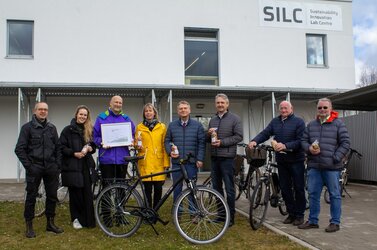
The European Campus Rottal-Inn (ECRI), sustainability campus of the Deggendorf Institute of Technology (DIT), received the "Silver" seal in the EU-wide "Bicycle Friendly Employer" certification. This makes ECRI the second campus in the whole of Bavaria to boast such a certification.
As a sustainability campus, ECRI has for years relied on various measures to make cycling to work more attractive. Last year, already existing offers, such as the "Bike Station", were expanded and extended by a whole concept. Under the direction of the university's sustainability officer, Prof. Dr. Michael Laar, and his research assistant, Laura Hoffmann, staff bicycles and sanitary facilities for cycling employees were introduced and a cycling competition was held. The two were supported by ECRI's sustainability lab. The package of measures was so well received by the ADFC, the German Bicycle Club, that it awarded the university the "Silver" seal of approval in the EU-wide "Bicycle-Friendly Employer" certification process after only nine months instead of the usual two to three years. Petra Husemann-Roew, regional manager at the ADFC national association, says: "The university supports employees who use bicycles to get to work with many different measures. This brings many advantages: The employer can thus score points in company health, environmental and mobility management."
The certification and the measures that go along with it primarily benefit the university's employees. Regular exercise improves health, increases motivation, reduces the carbon footprint and is easy on the wallet. In future, the experiences at ECRI will also be used at other DIT locations to create incentives to cycle to work.
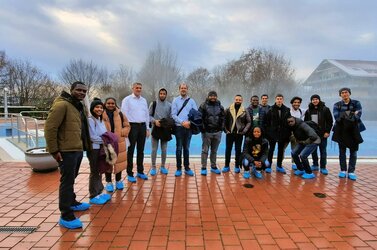
Students from the Industrial Engineering and Energy Systems Engineering study programmes from the European Campus Rottal-Inn (ECRI) worked on a project to develop concepts for a more sustainable energy supply for the thermal spa in Bad Griesbach. They have now presented the results to the spa management.
The spa triangle with its spas is an important economic factor for the region. Due to the current shortage of natural gas, the reduction of energy consumption and the use of alternative energy sources is becoming increasingly important for the neighbouring spas. As part of a student project, Prof. Dr. Matthias Huber looked for solutions together with the ECRI students. To this end, they carried out simulations of energy consumption and investigated the overall effect of the reduction in gas consumption necessary in the interests of sustainability. Combinations with renewable energies, such as electricity from photovoltaics, were also used. Based on the simulations and the testing of different variants, the students were able to come up with various ideas for reducing energy consumption.
The students presented the results of their project work to the spa management after a tour with a look behind the scenes of the feel-good spa Bad Griesbach. The concepts were discussed together and tested for feasibility.
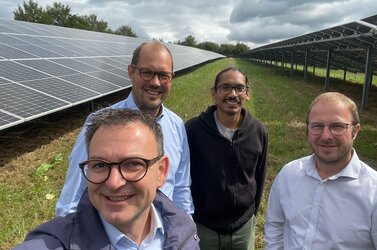
Against the backdrop of the energy crisis, renewable energies are to be increasingly used in the future. Once central technology is photovoltaics (PV), which generates electricity from the sun’s rays. As part of a Master’s thesis, the European Campus Rottal-Inn (ECRI) is looking at how solar energy can be used even more efficiently in the future.
There are already several PV parks in the district of Rottal-Inn. The plant in Gangkofen is equipped with innovative bifacial modules. These are special because they also produce electricity via the rear side and are even more efficient than conventional modules. In his Master’s thesis, ECRI student Irineu Auccappure, supervised by Prof. Dr.-Ing. Matthias Huber, is investigating the extent to which the use of radiation on the back of bifacial modules increases the use. For that he is examining factors such as the installation and orientation of the modules in the Gangkofen PV park.
Since realistic measurement and evaluation is not possible in the laboratory, Irineu Auccappure carried out the practical part of his Master’s thesis on site at the PV park. In an experiment, he covered the backs of selected modules with cardboard supported by wooden sticks and compared the energy production. The data collected in this way can be used to find out how the bifacial modules are set up and aligned to make the best use of the solar energy. One hundred percent of the materials used for the project are recycled materials.
Sustainability is the main theme for the operators of the PV plant. Thus, the park with a total output of 4,500 kWp not only produces electricity for an average of about 2,500 households, but was also planned and built according to the latest standards by sunbird energy GmbH. In the spirit of sustainability, the management of the PV park, FinRo®, always tries to leave a strip of green per row during each mowing so that there is enough food for the insects.
During the visit to the PV park, Prof. Huber from ECRI, Jan Kiermeier, Managing Director of sunbird energy GmbH and Harald Eder from FinRo® agreed to continue and expand the cooperation between the campus and the operators of the plant.
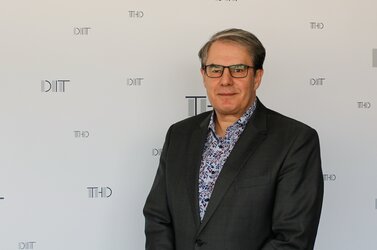
With the open lectures for adults, the European Campus Rottal-Inn (ECRI) offers a format for education-hungry adults. The next lecture in the series will take place on 22 September at 5 pm. The topic this time is: Climate protection concerns us all – the ecological footprint.
There is talk everywhere that humans are destroying planet earth. With the way we manage, consume and empower ourselves. In fact, there is probably little that can be done about it. But does this image help us when it comes to stopping climate change? Prof. Josef Steretzeder explores this question in an interactive workshop at the open lectures for adults. Together with the participants, he will determine their personal ecological footprint, explain why less waste alone is not the solution and how a positive image of humanity can help us in climate protection.
The open lectures for adults is open to anyone interested, regardless of prior education. The lecture on climate protection will take place at the Sustainability and Innovation Lab Centre (SILC) at the campus in Max-Breiherr-Straße in Pfarrkirchen. Prior registration is not necessary.
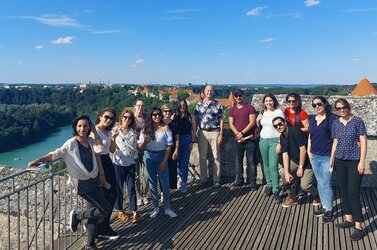
On 15 July, students from the Healthy and Sustainable Buildings course at the European Campus Rottal-Inn (ECRI) went on an excursion together with course director Prof. Dr. Michael Laar. They visited the company Schlagman Poroton and the town of Burghausen.
The group started at the Schlagman Poroton company in Zeilarn. The students learned about various building materials, including the world's best pure mineral highly insulating brick. The know-how and the range of products, as well as the ultra-modern production facilities, were therefore particularly interesting for the students at Schlagman Poroton. The company then invited the students to lunch together in Marktl.
Afterwards, the group went on to Burghausen. They immersed themselves in medieval architecture at the longest castle in the world. In addition to the buildings of the castle, the students also visited the museum with Renaissance paintings of the Bavarian State Gallery. They discussed, among other things, the development of perspectives in paintings since the Renaissance until today.
Urban planning also plays a major role for the students of the Healthy and Sustainable Buildings programme. Therefore, the group explored the historic city centre and the Grüben as an example of a well achieved balance between preservation of the historic substance and modern use at the same time. The adjacent Wöhrsee as an inner-city and sustainable leisure option was also on the agenda. During the excursion, the international students were not only interested in the technical topics. They also absorbed the information about the development of Bavarian culture. The knowledge about the historical development as well as the modern and innovative building materials form an important basis for the students' future work in Bavarian and German companies.
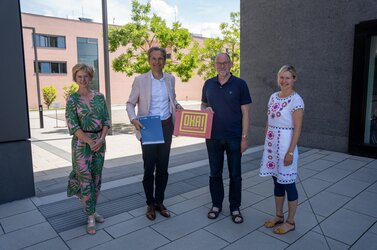
The Deggendorf Institute of Technology (DIT) has joined the initiative "OHA!-Ostbayern handelt". The association, based in Regensburg, is committed to sustainability and climate protection.
At the end of June, university president Prof. Dr. Peter Sperber and the first chairman of the association Eduard B. Wagner signed a cooperation agreement. The common goal is to promote a climate-neutral and sustainable society. In doing so, the cooperation partners support, among others, companies that take on a pioneering and exemplary role in climate neutrality and sustainability, as well as companies that want to set out on the path towards more sustainable business.
In 2016, DIT founded the Sustainable Development WG and thus formally recorded activities and efforts around the topic of sustainability for the first time. In 2021, the university appointed Prof. Dr. Michael Laar as sustainability officer and officially anchored the topic in the university structure. Since October 2021, Michael Laar has been working with representatives from eight German higher education institutions to develop practical intervention strategies and individual measures for saving energy. These are to be explicitly aimed at universities of applied sciences.
In Deggendorf, there are Bachelor's and Master's degree programmes in the field of environmental engineering, as well as in Pfarrkirchen at the European Campus Rottal-Inn the Master's degree programme "Sustainable and Healthy Buildings". Furthermore, the sustainability campus in Pfarrkirchen has a sustainability laboratory where students from different disciplines deal with the complementary topic of ecological, economic and social sustainability.
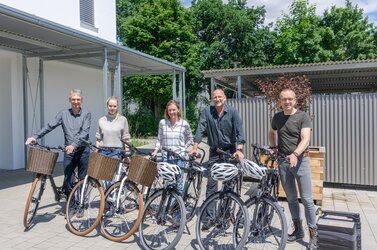
Employees of the European Campus Rottal-Inn (ECRI) can now make business trips quickly and, above all, CO2-free. Six company bicycles have recently been bought for the campus staff. This initiative was supported by the sustainability officer of the Deggendorf Institute of Technology (DIT), Prof. Dr. Michael Laar.
It is a trial that has been running at DIT Sustainability Campus in Pfarrkirchen since the beginning of June. Most of the business trips made from the campus are short journeys – mostly to the city centre for appointments or transport. These can be easily done by bike save CO2 compared to travelling by car. With the purchase of the company bikes, ECRI is trying to live up to its responsibility to be an environmentally friendly university. There is a separate shelter for the bikes and there is even a regular bicycle workshop for university staff. This is the first time such an offer has been made at a DIT location. If the concept proves to be a success consideration will be given to expand the offer to other university locations.
contact
If you have any questions or want further information, just send an e-mail to nachhaltigkeit@th-deg.de.
Sustainability Officer: Prof. Dr. Michael Laar
Deputy Sustainability Officer: Prof. Dr. Sascha Kreiskott










